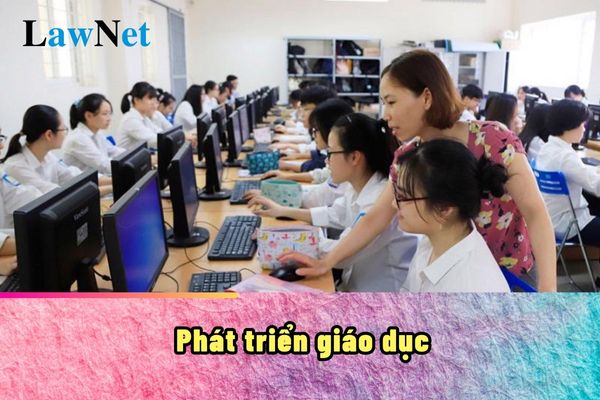Is educational development the first national priority in Vietnam?
Is educational development the first national priority in Vietnam?
Based on Article 4 of the Education Law 2019, the regulation on educational development in Vietnam is as follows:
Educational development
1. educational development is a foremost national policy.
2. educational development must be linked with the needs of socio-economic development, scientific and technological progress, and the strengthening of national defense and security; it must ensure standardization, modernization, and private investment; balances the structure of various disciplines, levels, and human resources; adapts to regional characteristics; expands the scale on the basis of quality and efficiency; and integrates training with utilization.
3. Develop an open education system, build a learning society to create opportunities for everyone to access education, learn at all levels, in all forms, and engage in lifelong learning.
Therefore, according to the above regulation, educational development is a foremost national policy of the State of Vietnam.

Is educational development considered a foremost national policy in Vietnam? (Image from the Internet)
What are the state's policies on development of continuing education in Vietnam?
Based on Article 46 of the Education Law 2019, the state’s policies on regular educational development are specified as follows:
- The state has a policy to invest in the development of regular education, particularly education for everyone, promoting adult learning, and fostering a learning society; encourages organizations and individuals to participate in and provide quality regular education services to meet the lifelong learning needs of learners.
- Agencies and organizations have the responsibility to facilitate officials, public employees, and workers' continual, lifelong learning to enhance their self-development and quality of life.
- Vocational education institutions and higher education institutions are responsible for cooperating with regular education institutions in supplying educational resources to meet the learning needs of students; teaching institutions are responsible for researching educational sciences, and training and fostering teachers within regular education institutions.
Does the state budget invest in developing education in ethnic minority areas in Vietnam?
Based on Article 96 of the Education Law 2019, the regulation on state budget for investment in education is as follows:
State Budget Investment for Education
1. The state prioritizes education budget allocation, ensuring that state budget spending on education and training is at least 20% of the total state budget expenditure.
2. The state budget spending on education is allocated based on the principles of transparency and democracy; considering the scale of education, socio-economic development conditions of each region; ensuring the budget for implementing universal education and developing education in ethnic minority areas and regions with special socio-economic difficulties.
The state is responsible for allocating adequate and prompt funding to implement universal education in accordance with the academic year's progress.
3. Education management agencies and educational institutions are responsible for effectively managing and using the allocated education budget and other revenues as per legal regulations.
Thus, according to the above regulation, the state budget will invest in developing education in ethnic minority areas and regions with special socio-economic difficulties.
What are the policies of the State on vocational education development in Vietnam?
Pursuant to Article 6 of the Law on vocational education 2014, the policies of the State on vocational education development in Vietnam are as follows:
- Develop an open, flexible, and diverse vocational education system towards standardization, modernization, democratization, private investment, and international integration, ensuring the connectivity between different vocational education levels and other training levels.
- Investment in vocational education is prioritized in the socio-economic development and human resources development plan. The budget for vocational education is prioritized within the total state budget for education and training; allocated transparently and promptly.
- Invest in enhancing training quality, developing the network of vocational education institutions according to planning; focus on forming several high-quality vocational education institutions to meet the labor market needs and students' learning demands and gradually popularize vocational training for youths.
- The state has policies to channel students graduating from lower and upper secondary schools into vocational education in line with socio-economic development phases.
- Priority investment is given to training key national industries and sectors; industries with advanced regional and international standards; focusing on vocational education in areas with special socio-economic difficulties, ethnic minority regions, border areas, islands, and coastal areas; investing in training for professions in demand in the labor market but challenging for private investment.
- The state implements mechanisms for bidding and ordering training for specific vocational sectors; key economic sectors; professions in labor demand but challenging for private investment. All types of vocational education institutions can participate in the bidding, ordering mechanisms specified in this clause.
- Support for beneficiaries of preferential policies for people with contributions to the revolution, demobilized soldiers, ethnic minorities, poor and near-poor households, disabled individuals, orphans without support, offshore fishermen, rural workers in agriculture households whose farming land is expropriated, and other social policy beneficiaries to provide opportunities for them to study, find jobs, self-employment, and establish a business; ensuring gender equality in vocational education.
- The state facilitates vocational education institutions in organizing scientific research and technological application; integrating training with research and production, business, and service activities to improve training quality.

